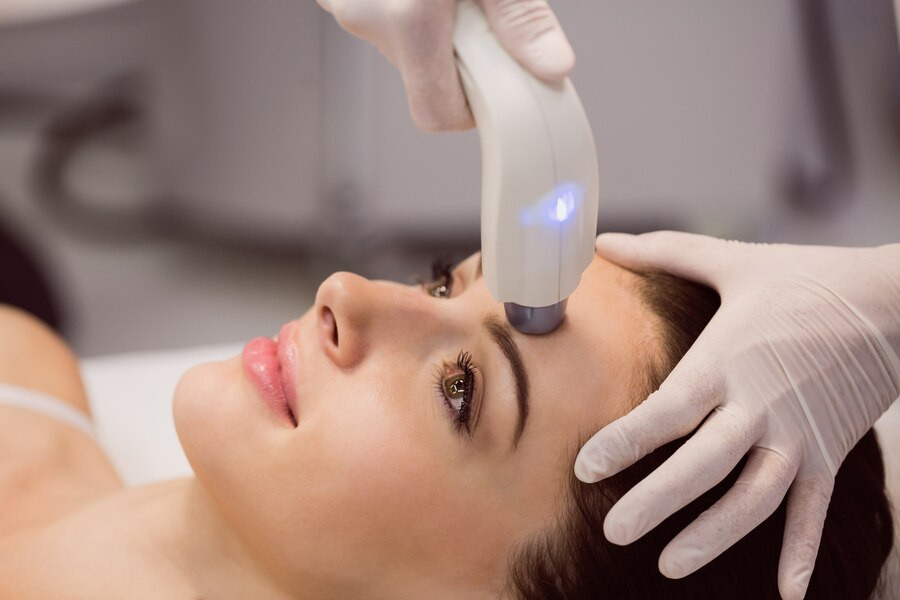Teknologi laser telah memberikan kontribusi besar dalam dunia perawatan kecantikan, salah satunya untuk mengencangkan kulit. Teknologi ini digunakan karena kemampuannya merangsang produksi kolagen, meningkatkan elastisitas kulit, dan menghasilkan efek pengencangan yang signifikan.
Teknologi laser banyak dipilih karena sifatnya yang non invasif atau minim invasif. Artinya, tidak dibutuhkan pembedahan besar dan waktu pemulihan yang lama untuk meningkatkan kekencangan kulit. Yuk, ketahui lebih lanjut bagaimana prosedur laser digunakan dalam mengencangkan kulit.
Apa itu Laser Skin Tightening
Seiring bertambahnya usia, produksi kolagen secara alami akan mengalami penurunan. Selain mengalami penurunan, kolagen juga berubah secara struktural di mana jaringan serat yang sebelumnya terorganisir rapat menjadi lebih tidak teratur.
Penurunan dan perubahan struktur kolagen ini mengakibatkan kehilangan kekencangan dan elastisitas kulit. Paparan sinar matahari, polusi, rokok, dan faktor lingkungan lainnya juga dapat mempercepat proses penuaan kulit dan menyebabkan penurunan kualitas kulit. Untuk itu, prosedur laser hadir membantu mengatasi masalah penurunan produksi kolagen dan elastin.
Prosedur laser yang dilakukan untuk mengencangkan kulit disebut laser skin tightening. Prosedur ini termasuk prosedur non bedah atau minimal invasif yang digunakan untuk mengencangkan kulit tubuh menggunakan teknologi laser. Proses ini cukup disukai karena relatif tidak menyakitkan dan dapat dilakukan di berbagai area tubuh termasuk perut, leher, wajah, dan garis rahang.
Baca Juga: Serba-Serbi Perawatan Laser untuk Menghilangkan Bekas Luka
Prosedur Laser Skin Tightening
Pada dasarnya, prosedur laser skin tightening menggunakan laser untuk memanaskan kulit pada tingkat yang masih bisa ditoleransi oleh kulit. Panas yang dihasilkan laser akan merangsang kulit untuk memproduksi lebih banyak kolagen dan elastin.
Berikut adalah prosedur laser skin tightening secara umum:
- Laser inframerah digunakan untuk menembus ke bawah kulit tanpa merusak lapisan permukaan. Ini memungkinkan laser mencapai lapisan kulit yang lebih dalam di mana terdapat kolagen dan jaringan ikat
- Sinar laser tersebut kemudian akan memanaskan kolagen di bawah kulit. Tidak perlu khawatir karena panas yang dihasilkan oleh laser mirip seperti pijatan batu panas, namun tetap cukup untuk merangsang kolagen tanpa merusak jaringan kulit
- Panas yang diberikan oleh laser menyebabkan laser mengerut sehingga memicu respons tubuh memproduksi lebih banyak kolagen baru sebagai bagian dari proses penyembuhan alami
- Dengan kolagen baru yang dihasilkan, kulit menjadi lebih kencang dan elastis
Mengencangkan kulit dengan prosedur laser ini biasanya memakan waktu sekitar 30-90 menit, tergantung pada seberapa banyak area yang perlu dikencangkan. Setiap klinik perawatan mungkin memiliki prosedur dan lama pengerjaan yang berbeda-beda. Anda bisa berkonsultasi terlebih dahulu sebelum menjalani prosedur tersebut.
Baca Juga: Amankah Menghilangkan Bulu Dengan Laser Hair Removal?
Adakah Efek Samping Prosedur Laser Skin Tightening?
Secara umum prosedur pengencangan kulit dengan laser ini aman dilakukan. Namun, prosedur ini hanya boleh dilakukan oleh dokter kulit kosmetik atau ahli kulit yang profesional dan terlatih.
Namun, masih ada beberapa risiko dan efek samping yang mungkin terjadi, di antaranya:
- Kemerahan
- Pembengkakan ringan
- Rasa cekit-cekit
- Terbentuknya jaringan parut atau perubahan warna kulit
- Ketidaknyamanan selama prosedur
Pengencangan kulit dengan laser tidak boleh dilakukan pada pasien dengan riwayat kanker kulit atau wanita hamil. Orang dengan konsumsi obat tertentu atau memiliki kondisi kulit tertentu juga mungkin tidak cocok melakukan prosedur ini.
Sebelum memutuskan melakukan prosedur pengencangan kulit dengan laser sebaiknya diskusikan terlebih dahulu dengan dokter, dan pertimbangkan risiko serta efek samping yang mungkin terjadi. Anda juga bisa memanfaatkan layanan konsultasi kesehatan dengan mengunduh aplikasi Ai Care melalui App Store atau Play Store.
Mau tahu tips dan trik kesehatan, pertolongan pertama, dan home remedies lainnya? Cek di sini, ya!
- dr. Monica Salim
Blyss Splane (2022). Types of Cosmetic Laser Procedures. Available from: https://www.verywellhealth.com/cosmetic-laser-procedures-decoding-2710211
Grace Gallagher (2020). Everything to Know About Laser Skin Tightening. Available from: https://www.healthline.com/health/beauty-skin-care/laser-skin-tightening
Mathieu Rees (2022). What to know about laser skin tightening. Available from: https://www.medicalnewstoday.com/articles/laser-skin-tightening
Radiation Safety Institute of Canada. Cosmetic Lasers. Available from: https://radiationsafety.ca/factsheets-cosmetic-lasers/
Cleveland Clinic (2022). Collagen. Available from: https://my.clevelandclinic.org/health/articles/23089-collagen
Alicia Ramella (2022). Elastin: What to Know. Available from: https://www.webmd.com/skin-problems-and-treatments/elastin-what-to-know
Harvard TH Chan (2021). Collagen. Available from: https://www.hsph.harvard.edu/nutritionsource/collagen/











